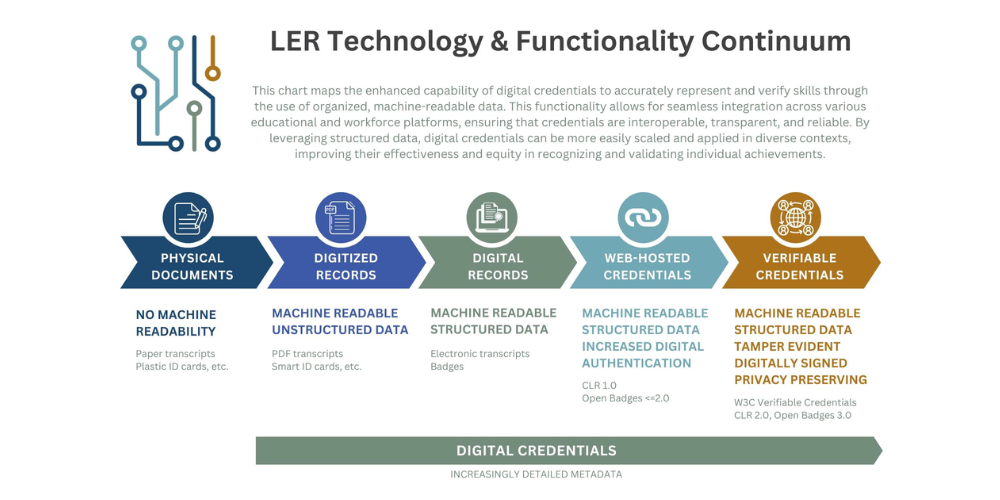
By the LER Accelerator coalition
The global shift toward skills-based hiring and lifelong learning has underscored the need for a more dynamic and interoperable system for documenting learning and employment experiences. Traditional transcripts and resumes, while still relevant, fail to capture the full range of competencies, skills, and experiential learning that individuals acquire throughout their educational and professional journeys.
Recognizing this challenge, 12 leading higher education associations—as members of the LER Accelerator coalition—have come together to adopt a unified set of nine core principles guiding the development and adoption of Learning and Employment Records (LERs). This landmark collaboration represents a major milestone in aligning education and skills development with workforce needs, ensuring that verifiable, portable, and learner-controlled credentials empower individuals to navigate lifelong learning and career advancement.
The LER Accelerator initiative, launched in 2024 with support from Walmart, is dedicated to accelerating the adoption of interoperable, skills-based credentialing systems that bridge higher education and employment. The coalition, led by AACRAO, includes organizations representing admissions, enrollment management, academic advising, career services, institutional research, competency-based education, and information technology—each playing a critical role in ensuring that LERs are designed for broad usability, accessibility, and integration with workforce opportunities.
LERs as a Process, Not Just a Product
In a recent webinar announcing the shared principles, LER Accelerator coalition members dove deeper into how LERs provide a more dynamic, flexible, and transparent pathway for recognizing and communicating learning outcomes. LERs represent a paradigm shift, enabling individuals to own, manage, and share their learning and employment data across educational institutions, employers, and workforce systems. However, realizing the full potential of LERs requires a principled approach that prioritizes the needs of learners while ensuring technical and ethical integrity.
A key part of this approach must also recognize LERs as a process—not just as a single product of static credential, but rather as part of a continuum of credentialing advancements. Institutions may find themselves at different points on this continuum, ranging from paper transcripts to digital records to machine-readable verifiable credentials. The nine principles are designed to support institutions at all levels of LER adoption, offering guidance as they evolve their credentialing practices over time.

Guiding Principles for LER Adoption
The LER Accelerator’s nine principles for LER adoption provide a framework for institutions as they move along the LER continuum.
1. Designed for All Users
LERs should be designed to be inclusive, accessible, and user-friendly for individuals across diverse backgrounds, learning environments, and career paths. This principle ensures that all learners—regardless of socioeconomic status, educational attainment, or employment history—can meaningfully engage with and benefit from LERs.
2. Skills-Centered and Competency-Focused
Unlike traditional transcripts, which primarily document course completions and grades, LERs should prioritize validated skills and competencies rather than simply documenting courses taken or degrees earned. This shift aligns with employer expectations for skills-based hiring and ensures that learning records provide actionable insights into an individual’s capabilities.
3. Accessible and Boundless
LERs should not be restricted by institutional or technical barriers. Individuals should have the ability to store, access, and share their records across platforms and institutions without unnecessary constraints. This principle emphasizes portability and lifelong learning, enabling learners to seamlessly transition between education and employment opportunities.
4. Centered on Learner Agency
LERs should enable learners and earners to retain control over their records. This includes the ability to decide what to share, with whom, and for how long. Moving away from institutional ownership of records toward learner-centered control marks a fundamental shift in the power dynamics of credentialing.
5. Privacy-Protected and Secure
As digital credentials become more widespread, robust privacy and security measures are imperative. LERs should adhere to recognized data governance frameworks, ensuring that personal information remains protected and that learners can manage their data in a transparent and informed manner.
6. Collaborative
LER development should involve broad stakeholder collaboration, including learners, educators, employers, policymakers, and technology providers. This ensures that LERs are designed to meet the needs of all users and that their implementation supports alignment between education and workforce systems.
7. Interoperable
LERs should be built on open, interoperable data standards to enable seamless integration across platforms and systems. Interoperability is essential for ensuring that credentials are portable, verifiable, and widely accepted across education, employment, and credentialing ecosystems.
8. Able to Provide Assurance of Identity and Achievement
Trust in LERs depends on rigorous verification of learner identity and credential authenticity. Institutions and credentialing bodies should follow best practices in digital identity verification to ensure that credentials are accurate, tamper-proof, and recognized across sectors.
9. Updatable and Time-Delineated
LERs should allow for updates, modifications, and expirations where appropriate. As skills and industry requirements evolve, LERs must reflect the most current and relevant information about an individual’s competencies and qualifications.
Principles in Practice
These shared principles for LER adoption provide a clear and ethical framework for ensuring that LERs serve learners first while maintaining technical and institutional integrity. As higher education, workforce systems, and credentialing bodies navigate this transformation, adherence to these principles will be essential for ensuring equitable access, interoperability, and learner empowerment.
The LER Accelerator is actively working to support institutions and organizations in building a stronger LER ecosystem. Explore best practices, case studies, implementation frameworks and other key resources in the initiative’s comprehensive LER resource hub developed in partnership with the Learn & Work Ecosystem Library.
Apply to Join Our Cohort, Receive Funding and Guidance
Institutions ready to take the next step can apply to participate in the coalition’s one-year cohort-based program and receive funding and structured guidance on planning or scaling their LER initiatives. Learn more about the LER Accelerator cohort opportunity and application process. Call for proposals deadline is March 10.
Together, we can build a more connected, learner-centered future.